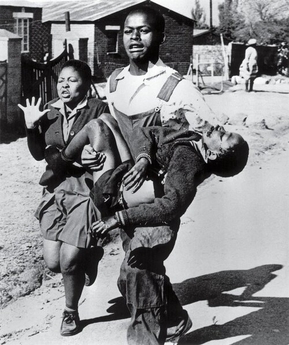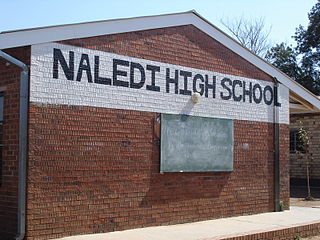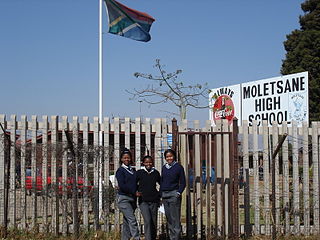
Soweto is a township of the City of Johannesburg Metropolitan Municipality in Gauteng, South Africa, bordering the city's mining belt in the south. Its name is an English syllabic abbreviation for South Western Townships. Formerly a separate municipality, it is now incorporated in the City of Johannesburg Metropolitan Municipality, and one of the suburbs of Johannesburg.

The Azanian People's Organisation (AZAPO) is a South African liberation movement and political party. The organisation's two student wings are the Azanian Students' Movement (AZASM) for high school learners and the Azanian Students' Convention (AZASCO) for university level students. The organisation's women's wing is Imbeleko Women's Organisation, simply known as IMBELEKO. Its inspiration is drawn from the Black Consciousness Movement inspired philosophy of Black Consciousness developed by Steve Biko, Harry Nengwekhulu, Abram Onkgopotse Tiro, Vuyelwa Mashalaba and others, as well as Marxist Scientific Socialism.

Zolile Hector Pieterson was a South African schoolboy who was shot and killed at the age of 12 during the Soweto uprising, when the police opened fire on black students protesting the enforcement of teaching in Afrikaans, mostly spoken by the white and coloured population in South Africa, as the medium of instruction for all school subject whereas they wanted to learn in their native languages, Xhosa and Zulu. A news photograph by Sam Nzima of the mortally wounded Pieterson being carried by another Soweto resident while his sister ran next to them was published around the world. The anniversary of his death is designated Youth Day in South Africa.
The following lists events that happened during 1976 in South Africa.

The Hector Pieterson Museum is a museum located in Orlando West, Soweto, South Africa. Located two blocks away from where student protester Hector Pieterson was shot and killed on 16 June 1976, the museum is named in his honour and covers the events of the anti-Apartheid Soweto Uprising, where more than 170 protesting school children were killed.

The Soweto uprising was a series of demonstrations and protests led by black school children in South Africa during apartheid that began on the morning of 16 June 1976.

Orlando Stadium is a multi-purpose stadium in Soweto, a township in Johannesburg, in Gauteng province in South Africa. It is the home venue for Orlando Pirates Football Club, a professional soccer team that plays in the Premier Soccer League and owned by the City of Johannesburg.
Alfred Khumalo, better known as Alf Kumalo, was a South African documentary photographer and photojournalist.
Teboho "Tsietsi" MacDonald Mashinini in Jabavu, Soweto, South Africa, died in the summer of 1990 in Conakry, Guinea, and buried in Avalon Cemetery, was the main student leader of the Soweto Uprising that began in Soweto and spread across South Africa in June, 1976.

Sarafina! is a 1992 musical drama film based on Mbongeni Ngema's 1987 musical of the same name. The film was directed by Darrell Roodt and written by Ngema and William Nicholson, and stars Leleti Khumalo, Miriam Makeba, John Kani, Ngema, and Whoopi Goldberg; Khumalo reprises her role from the stage performance.

Naledi High School is a government secondary school at 892 Nape Street in Soweto. The school took an important role at the start of the Soweto Uprising in 1976.

Morris Isaacson High School is a government secondary school in Soweto. Founded in 1956, the school took an important role at the start of the Soweto Uprising in 1976.
Thutolore Secondary School is a government secondary school on Madubane Street in Soweto, Johannesburg.

Moletsane High School is a government secondary school in Soweto, South Africa. Founded in 1972 it became a secondary school in 1976. Students from the school were involved in the Soweto Uprising in 1976. The school's public/private partnership and the school's improvements in its results were praised by the South African Minister for Education.
"Soweto Blues" is a protest song written by Hugh Masekela and performed by Miriam Makeba. The song is about the Soweto uprising that occurred in 1976, following the decision by the apartheid government of South Africa to make Afrikaans a medium of instruction at school. The uprising was forcefully put down by the police, leading to the death of between 176 and 700 people. The song was released in 1977 as part of Masekela's album You Told Your Mama Not to Worry. The song became a staple at Makeba's live concerts, and is considered a notable example of music in the movement against apartheid.
Melville Leonard Edelstein was born to Nachum and Rose Edelstein in King William's Town. His Litvak parents had first travelled to the UK and then Cape Town in 1896 before joining the masses of "boere-Jode" [Afrikaner or farmer Jews] where his parents had settled and Nachum started and ran a successful business. Edelstein was the grandson of Michael Edelstein who established the first synagogue at King William's Town.

Faith Nonhlanhla Mazibuko is a South African politician from Gauteng. She is the current Member of the Executive Council (MEC) for Community Safety. She has been a Member of the Gauteng Provincial Legislature from 1996 to 2004 and currently from 2009. Mazibuko is a member of the African National Congress.
Matsemela Manaka (1956–1998) was a South African playwright, poet, and artist. He began his career in the mid-1970s and was influenced by the ideas of the Black Consciousness Movement. Among his plays, the most distinguished are Egoli: City of Gold and Children of Asazi. He won the PEN/Barbara Goldsmith Freedom to Write Award in 1987.
The South African Students' Movement (SASM) was an anti-apartheid political organisation of South African school students, best known for its role in the 1976 Soweto uprising. By 1976 it was strongly identified with the Black Consciousness Movement. It was banned by the apartheid government in October 1977 as part of the repressive state response to the uprising.
Sediane Danny "Sechaba" Montsitsi was a South African politician and former anti-apartheid activist. One of the leaders of the 1976 Soweto uprising, he later represented the African National Congress in Parliament from 1994 to 2014.









